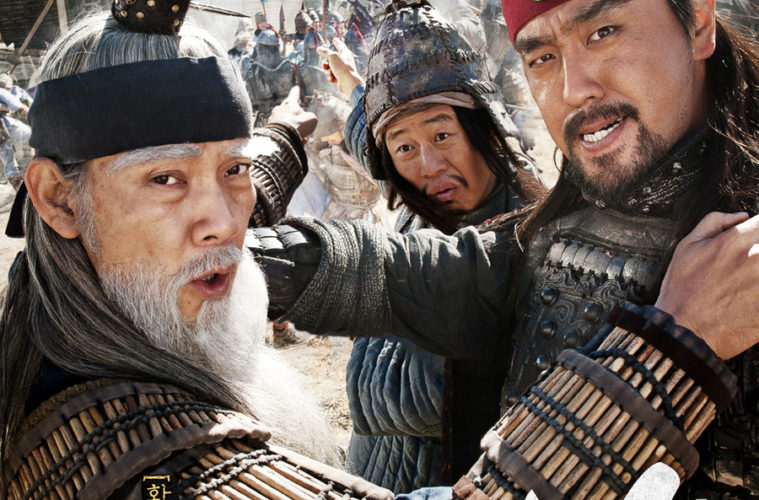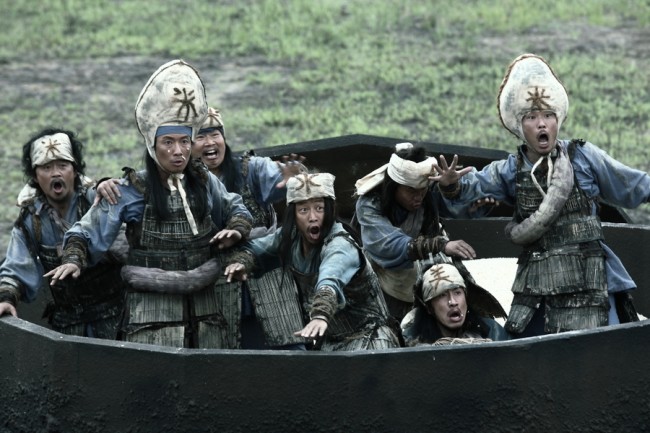Paradoxes abound in Battlefield Heroes, a South Korean film showing at the New York Asian Film Festival. Even the title itself, an English slap-on as American audiences would never understand what its literal translation, Pyongyang Castle, refers to, belies what the story is about. For, at its center, the best heroes are no where near a battlefield.
Silla, an upstart power in Korea, has decided to attack the kingdom of Goguryeo, one that has withstood many assaults during its 700 year reign in the region. This attack comes with the backing of the Chinese Tang dynasty who will play the two regional powers against each other only to swoop in later and pick up the pieces. In between this large battle there are a good number that occur on the ground and in leadership.
The Chinese Tang Dynasty has their eyes on on the Goguryeo kingdom, one of the oldest and most powerful in all of Korea. It has withstood countless attacks over its 700 year reign including one from 30,000 Tang soldiers. From this loss, the Tang army has learned a lesson: why suffer the consequences of battle when you can have someone else do it? They enlist the help of Silla, and their foolish, power-hungry king agrees if his kingdom can expand after the war. The Tangs say yes and the king takes them at his word. Said he was foolish.
The plan is for the entire Silla army to act as the first wave with the Tangs to come by and pick up the pieces, a strategy that the old, wise Sillan Grand General Kim Yoo-Shin (Jeong Jin-Yeong) advises against. But who is he to not follow the orders of a king? The army begins “enlisting” peasants and farmers to fight in the kingdom’s good name. Some, like the hard-line Moon-Di (Lee Kwang-Soo) see this battle as an opportunity to fight with honor. Others, like Thingy (Lee Mun-Shik), a veteran deserter, see it as an opportunity to die prematurely. A battery of folks like Thingy are the ones who are to take the front lines and fight against one of the most ferocious armies in the region.
Goguryeo’s fearless general, Yeon Gaesomun (Lee Won-Jong), is killed early on in battle, leaving a power vacuum that he decides upon as he’s yanking arrows out of his chest. Taking the title is a lot to live up to, clearly. He passes over his first born son, Nam-Seang (Je-mun Yun), the rightful heir to the throne who is too much of a politician and selects Nam-Geon (Seung-yong Ryoo) to take control of the army. The prissy and powerless king doesn’t put up a fight. Soon after, Nam-Geon tires of Nam-Seang’s constant politicking and expels him from the kingdom via catapult where he lands safely in the Tang camp and defects to the rival’s cause.
This is a film that glorifies and demonizes war all at the same time. The entire thrust of the film is the three-day battle between the two kingdoms and the forceful hand of their Chinese neighbors. Combat, however, is not always a serious endeavor. Indeed, there is a lighthearted section where our reluctant Silla warriors try to end the war early by trading rice (which they have in abundance) to their foes (who eat acorns). In response, the Goguryeo forces go all Monty Python on their asses, catapulting over livestock that thankfully lands on the other side, on their feet, unharmed (until they’re eventually killed and eaten, one presumes). There’s even an attack with bees. But with all of this, nameless, faceless hordes are still struck down, blades cutting and blood gushing.
That would be a fine juxtaposition if not for the message at the heart of the film. There is a rather moving monologue where Thingy, a survivor of one conflict, explains that the war is fought by the peasants but won the the upper class. The people in power have everything to gain and nothing to lose (least of all, their lives). It is difficult to divorce the film from the political situation in Korea: two forces, divided, fighting because of the greed of one leader as the people are used like pawns.
It is a gorgeous looking film, full of bright colors, beautiful exterior sets, great camera angles and slick direction from Jun-ik Lee. And I certainly appreciate the noble effort to insert some kind of reality amiss a movie of frivolousness. But I’d rather the film practice what it preaches and not gore-out when given the opportunity.
Battlefield Heroes is currently screening at the New York Asian Film Festival.
Note: The names of the characters in the subtitles did not always match-up with cast lists found on IMDb and other places on the internet. I did the best I could to differentiate it, but as a man ignorant of Korean, I very probably screwed that up. Many apologies if I did.


